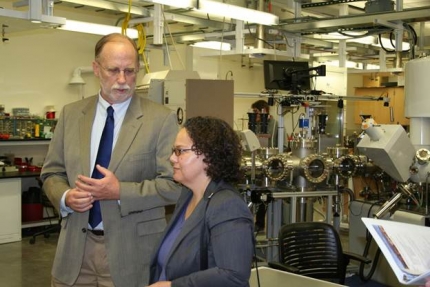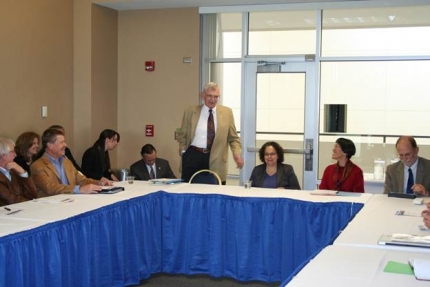Built to Last: Energy and the Environment in the Southwest
CISSEM is one of 46 Energy Frontiers Research Centers created under the American Recovery and Reinvestment Act of 2009. These centers are focused on transformative innovations in renewable energy production that will reduce our dependence on foreign oil and protect our environment. Appropriate to Arizona’s photon-rich landscape, UA’s center is at the cutting edge of the effort to create solar cells that are economically competitive with fossil fuels. Such cells must be both relatively inexpensive to manufacture and efficient at converting sunlight into electricity.
After visiting CISSEM’s laboratories, Chair Sutley was briefed on UA’s own sustainability efforts by Senior Associate Vice President for Business Affairs Bob Smith. In the Southwest, water management is a critical priority, and UA is conserving through efforts including waterless urinals, reclaimed water irrigation, water harvesting, xeriscaping, and irrigation scheduling. The University is also actively reducing energy consumption by installing photovoltaic and solar thermal panels on a number of campus buildings, lighting retrofits, combined heat and power plants, HVAC scheduling, high-efficiency boilers, smart thermostats, and more.
Chair Sutley wrapped up her visit to the University of Arizona at a sustainability roundtable with UA scientists, administrators, and students, moderated by UA Provost Jacquelyn Mok. In her opening remarks, the Chair noted several of the challenges facing federal policymakers: How do we best take advantage of the information technology revolution? How do we think about federal assets in the face of a changing planet so that we can provide actionable information to local and regional managers? And, how do we change from a stovepipe mindset to bring a systems approach to managing natural resources and energy systems? Steered by Executive Dean Joaquin Ruiz, a focus on water echoed throughout the discussion, since water is a critical variable in all natural resource issues including energy production. The discussion ended with an impassioned plea from undergraduate Noelle Espinosa for continued federal support of our nation’s universities that foster innovative programs such as CISSEM and help lay the groundwork for a prosperous, sustainable future for America.
Neal R. Armstrong is Director of the Center for Interface Science: Solar Electric Materials at The University of Arizona
White House Blogs
- The White House Blog
- Middle Class Task Force
- Council of Economic Advisers
- Council on Environmental Quality
- Council on Women and Girls
- Office of Intergovernmental Affairs
- Office of Management and Budget
- Office of Public Engagement
- Office of Science & Tech Policy
- Office of Urban Affairs
- Open Government
- Faith and Neighborhood Partnerships
- Social Innovation and Civic Participation
- US Trade Representative
- Office National Drug Control Policy
categories
- AIDS Policy
- Alaska
- Blueprint for an America Built to Last
- Budget
- Civil Rights
- Defense
- Disabilities
- Economy
- Education
- Energy and Environment
- Equal Pay
- Ethics
- Faith Based
- Fiscal Responsibility
- Foreign Policy
- Grab Bag
- Health Care
- Homeland Security
- Immigration
- Innovation Fellows
- Inside the White House
- Middle Class Security
- Open Government
- Poverty
- Rural
- Seniors and Social Security
- Service
- Social Innovation
- State of the Union
- Taxes
- Technology
- Urban Policy
- Veterans
- Violence Prevention
- White House Internships
- Women
- Working Families
- Additional Issues



